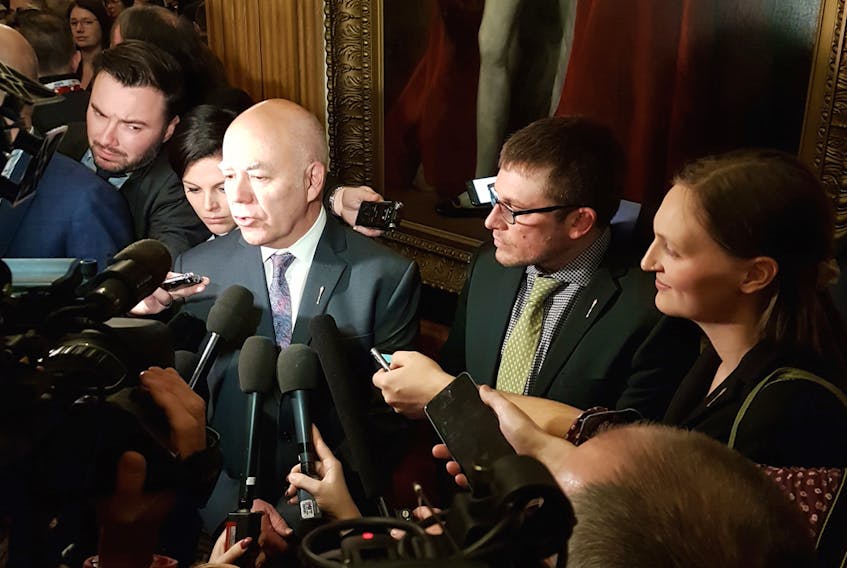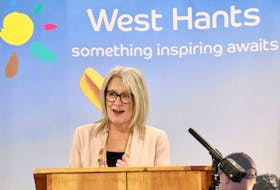SACKVILLE, N.B. — When Megan Mitton steps in the legislature or enters a committee meeting in Fredericton, she’s often taken aback by some of the questions she gets asked by her colleagues.
Where’s your daughter? Who’s taking care of her? How are you able to parent?
While she knows the questions are well-intended, she wonders if male members of the Legislature get asked the same things. Her gut tells her no.
“They just seem so amazed that my husband would take on more of a role at home,” says Mitton, the newly-elected Green MLA for Memracook-Tantramar.
What amazes her is the gender stereotypes that still continue to pervade both the political and public sphere in 2019. And she believes this is just one of the many deterrents that may be influencing some women to turn away from a life in politics.
“People still have certain traditional perceptions about the work that women do and the work that men do … as well as certain ideas about parenting,” she says.
“There are lots of reasons a woman may not run and this feeds into it.”
It’s been more than eight decades since women in New Brunswick have been given the right to run for office, yet Mitton frustratingly admits the province isn’t even close to achieving gender equality in politics.
Despite making up about 50 per cent of the population, women are still severely underrepresented in the Legislative Assembly and in key leadership roles in all branches of government.
Mitton was one of 11 women elected to the 49-seat New Brunswick Legislature in September. This means the number of female members now account for 22 per cent of MLAs in the legislative assembly, a slight bump up from 16 per cent in the 2014 election when eight women were elected; but a far cry from what needs to happen, says Mitton. At this rate, New Brunswick would achieve gender parity in about 215 years, she adds, something she feels is simply not acceptable.
“We need to change politics and our political system … we can change the system to better support women.”
According to a United Nations report, a minimum of 30 per cent representation is needed to have any significant influence on decision making. Mitton points out women are not the only group underrepresented in politics. LGBTQ community members, Indigenous people, people of colour, people with disabilities and youth all need their voices to be heard more on policies that affect them.
Mitton says it’s important to have greater female representation because women bring different perspectives to the table.
“Women can bring a different approach, based on different lived experiences,” she says.
There is established and growing evidence worldwide that women’s leadership in political decision-making processes improves them. And having a significant number of women among elected representatives helps ensure issues of importance to women get brought to the table more often – pay equity, child care, reproductive justice, gender-based violence, parental leave, education, wellness and health care.
“Everyone benefits when more women are in power,” says Mitton.
But there are numerous barriers that prevent or discourage women from running for office and getting elected.
Societal attitudes lead to women underestimating their talents and having a lack of self-confidence needed to seek nomination.
Mitton says during her recent election campaign, as she went door to door, she heard comments like, “don’t run, it’s bad for your family,” or “go home and spend time with your kid.” She believes she had a harder time earning votes – and respect – because she was a young woman who was just starting a family and people were questioning how she was going to handle it all.
Changing perceptions isn’t easy, she says, but talking about the issue is the first step. And getting more women to participate will help normalize the career path.
Mitton recalls during her university years taking part in a ‘Women in House’ event in Ottawa, where she shadowed NDP Member of Parliament Dawn Black for a day. She vividly remembers Black telling her of the sexism that existed in the House of Commons back then and advising her, if she had political ambitions, to wait until later in life after she raised her family.
Now 32, and with a two-year-old daughter, Mitton says she decided to ignore that advice because she feels an urgency, as both a woman and a mother, to step forward to help address some of the pressing issues that are of increasing concern – in particular health care and the climate change crisis.
“It’s worth it, because it’s for her and for all the children,” she says.
Improved availability of child care in the Legislature would help open the doors wider for women’s participation, says Mitton, as well as making other structural changes to move away from such a male-dominated system.
Women also need a support network if they’re to run a campaign and get elected, and few women find they can get that social and economic support to juggle family and political obligations.
“She can’t do it alone,” says Mitton.
The nature of politics itself is also another obstacle within the system that may play a role in women’s exclusion, she notes. Often adversarial and combative, the political arena can seem aggressive and nasty and, “I know that turns some women off from politics.”
“We can do things differently, we can start to think of things differently.”
She says there is a pressure sometimes for women to fit into the “status quo of politics” and it can be a real challenge to ignore the naysayers and to find your own way.
“I know that even after being elected, people are looking at me and wondering if I’m cut out for it and sometimes telling me that I’m not,” says Mitton.
“But I just try to be myself and to be okay with being a woman … to not use aggressive and confrontational language because that’s not me.”
Mitton says while many still question whether women are cut out for politics, she says they should be asking how we’re going to change politics and our institutions so they are cut out for women.
RELATED:
Is another New Brunswick election just a matter of time?
Eventful week in Legislature for new Memramcook-Tantramar MLA









